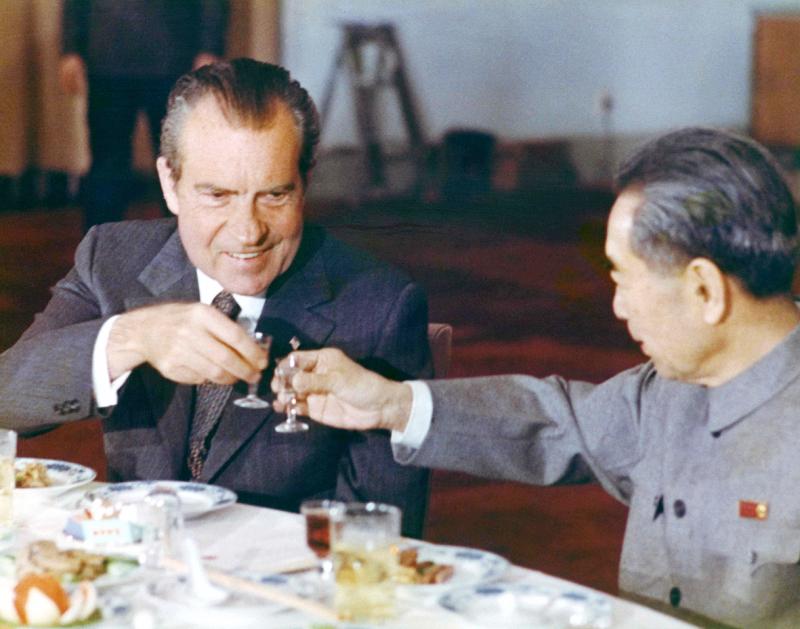In a brisk winter day in February 1972, the 34-year-old American diplomat, Winston Lord, arrived in Beijing with his boss, Henry Kissinger, and president Richard Nixon. Barely an hour after they checked in to their guest house, a message came: “Chairman Mao [Zedong, 毛澤東] wants to see president Nixon.”
The urgency from Mao resonated with the excitement from the American delegation. The establishment of bilateral relations offered great opportunities for both sides in facing a common enemy: the Soviet Union. For more than two decades since the Chinese communists took over the mainland, Beijing and Washington had had no official contact on this scale.
Much to his surprise, Lord was asked to go along into the meeting with Mao as a note-taker. Secretary of state William Rogers was not asked to attend and, so as not to upset Rogers, Nixon ordered Lord to be cropped out of the official photograph released to the press.

Photo: AFP
“The meeting took place in Mao’s residence, in a medium-sized room filled with books and manuscripts, like a library,” Lord recalled in an interview with the Guardian. “The atmosphere was modest, compared to the enormity of the event.
TAIWAN QUESTION
“Mao [also] bantered about how he and Chiang Kai-shek (蔣介石) were enemies,” but Mao viewed it as essentially a “family quarrel,” Lord said, referring to the leader of the nationalists who fled to Taiwan after the defeat in the Chinese civil war in 1949.

Photo: AFP
He continued: “[Mao] said, ‘We don’t have to solve difficult problems — he didn’t say Taiwan specifically, but that’s what he was referring to — immediately.’ So basically he was saying we can postpone the Taiwan issue while we get on with areas we agree on, for example balancing the Soviet Union.”
The week-long visit concluded with the signing of the Shanghai communique. On Feb. 27, 1972, the US “acknowledged” that “all Chinese on either side of the Taiwan Strait maintain there is but one China and that Taiwan is a part of China.”
The US also reaffirmed “its interest in a peaceful settlement of the Taiwan question by the Chinese themselves.”
The trip was hailed as much a diplomatic breakthrough as a TV spectacular. When he landed at Andrews air force base outside Washington after the week in China, Nixon received a hero’s welcome led by his vice-president, Spiro Agnew. Life Magazine’s Hugh Sidey recalled the murmur of a fellow journalist next to him at the airport: “My God, it’s like the arrival of the king.”
Years later, the visit inspired an opera.
Half a century on, this event has lost its sparkle in both capitals. In Washington, critics now question the wisdom of Nixon’s 1972 trip; many see China as an economic threat and — like Russia — a geopolitical enemy. In Beijing, there’s an increasingly louder view that the US is in its terminal decline and China’s system is ultimately superior. On Feb. 4, the leaders of China and Russia declared: “there are no ‘forbidden’ areas of cooperation,’” in a clear message to the US.
This month, as both countries mark the anniversary, Washington has been embroiled in a mind game with Moscow over whether Vladimir Putin is to launch a full-scale invasion of Ukraine. Beijing, at the same time, was keen to remind Washington of what it sees as the biggest achievement of Nixon’s trip: the Shanghai communique and the status of the island of Taiwan.
Speaking at a press conference on Feb. 10, China’s foreign ministry spokesperson, Zhao Lijian (趙立堅), emphasized to his audience the phrase of “one China” — which in Beijing is called a “principle” but in Washington a “policy” — and said the document was “the political foundation for the normalization of China-US relations and the establishment of diplomatic ties.”
In January, China’s ambassador to Washington, Qin Gang (秦剛), warned that the Taiwan issue was “the biggest tinderbox” between the two countries. He made it explicit that the US and China could face a military conflict “[i]f the Taiwanese authorities, emboldened by the United States, keep going down the road for independence.”
‘STRATEGIC AMBIGUITY’
Officially, the US’s position on Taiwan remains one that reflects “strategic ambiguity.” It does not endorse Beijing’s claim to sovereignty over Taipei, nor does it regard the island as an independent country. Washington, however, is committed by law to provide Taiwan with the means to defend itself. Yet as the relations have soured, some — such as the Republican senator Ted Cruz — have suggested the US should make its commitment to Taiwan more explicit.
The advocacy from Taipei is becoming more proactive, too. As the world watches the fate of Ukraine, Taiwan’s foreign minister, Joseph Wu (吳釗燮), warned that Beijing “might be thinking about a military attack against Taiwan” after the Winter Olympics. “We are not asking for war … but we won’t bow to China,” he vowed.
Some see the current state of play as inevitable and reflecting a structural issue between an incumbent power and a rising power. But Washington’s rethink of its China strategy began more than two decades ago when George Bush’s defense secretary, Donald Rumsfeld, presented him with a proposal to shift the US’s global strategic priorities towards Asia — and primarily China.
“Many thought that once [Donald] Trump left the White House, tensions between the US and China would have decreased,” said Zeno Leoni of King’s College London and the author of American Grand Strategy from Obama to Trump. “However, the fallout at the Anchorage summit in Alaska, the endurance of trade sanctions, and a boycott of Olympic Games not seen since the cold war confirms that problems are structural.”
Leoni saw a pattern in American grand strategy that encourages other countries, including former and potential rivals — Germany, Japan, China — to act as “locomotives” of a global economy that favors US interests.
“However, this strategy has led to several ‘blowbacks’ in recent decades, including the rise of China,” he said.
Lord insists Nixon’s approach to China half a century ago was “a brilliant strategic move.”
“What was the alternative?” he asked. “If we didn’t open up to China, we certainly wouldn’t have had … the arms control agreement that we had within months with the Soviet Union. We would not have had either China’s or the Soviets’ help as much on ending the Vietnam war. We would not have restored American credibility at home and abroad.”
“The thing that China would never have emerged without our help is nonsense,” Lord continued. “Given the size of the Chinese population and the talents of the Chinese people, it clearly was going up sooner or later. When they began to emerge, what was the alternative? Trying to contain China? In addition to this being dangerous, it was impossible, because other countries wouldn’t join us. It would be ineffective.”
But Leoni said whether Nixon’s China visit in 1972 was mistaken or not depended on whether we wanted to take the long view in history.
“That meeting led to great global economic growth and to the end of the cold war. Yet it also was a selfish move that benefited the US, and the long-term implications of the rapprochement were not thought through enough at the time.”
The stakes are high, and mismanagement of the US-China relationship is “arguably the biggest short-term threat to peace,” said Robert Daly of the Woodrow Wilson Center in Washington.
For more than 30 years, Daly has been observing the evolution of the bilateral relationship from both capitals.
Daly said observers tend to think of Nixon’s visit only as a big geopolitical chess game, but more significantly, that week in February 50 years ago opened the “floodgate” for people-to-people exchange. “It gave the people of both countries permission to interact.”
“Before 1972, the two countries saw each other only through the lens of security. After Nixon’s visit, they began to view one another in their full humanity,” Daly said. “Sadly, we are now reverting back to seeing each other solely through a security lens.”
Lord, now 84, said he did not agree with the prevailing view in Washington these days that America’s engagement with China had failed. He said the two countries were in the middle of a long strategic competition. “But we are not going to be close friends — and I hope we won’t be outright enemies for many decades to come.”

The Taipei Times last week reported that the rising share of seniors in the population is reshaping the nation’s housing markets. According to data from the Ministry of the Interior, about 850,000 residences were occupied by elderly people in the first quarter, including 655,000 that housed only one resident. H&B Realty chief researcher Jessica Hsu (徐佳馨), quoted in the article, said that there is rising demand for elderly-friendly housing, including units with elevators, barrier-free layouts and proximity to healthcare services. Hsu and others cited in the article highlighted the changing family residential dynamics, as children no longer live with parents,

The classic warmth of a good old-fashioned izakaya beckons you in, all cozy nooks and dark wood finishes, as tables order a third round and waiters sling tapas-sized bites and assorted — sometimes unidentifiable — skewered meats. But there’s a romantic hush about this Ximending (西門町) hotspot, with cocktails savored, plating elegant and never rushed and daters and diners lit by candlelight and chandelier. Each chair is mismatched and the assorted tables appear to be the fanciest picks from a nearby flea market. A naked sewing mannequin stands in a dimly lit corner, adorned with antique mirrors and draped foliage

The election of Cheng Li-wun (鄭麗文) as chair of the Chinese Nationalist Party (KMT) marked a triumphant return of pride in the “Chinese” in the party name. Cheng wants Taiwanese to be proud to call themselves Chinese again. The unambiguous winner was a return to the KMT ideology that formed in the early 2000s under then chairman Lien Chan (連戰) and president Ma Ying-jeou (馬英九) put into practice as far as he could, until ultimately thwarted by hundreds of thousands of protestors thronging the streets in what became known as the Sunflower movement in 2014. Cheng is an unambiguous Chinese ethnonationalist,

I was 10 when I read an article in the local paper about the Air Guitar World Championships, which take place every year in my home town of Oulu, Finland. My parents had helped out at the very first contest back in 1996 — my mum gave out fliers, my dad sorted the music. Since then, national championships have been held all across the world, with the winners assembling in Oulu every summer. At the time, I asked my parents if I could compete. At first they were hesitant; the event was in a bar, and there would be a lot